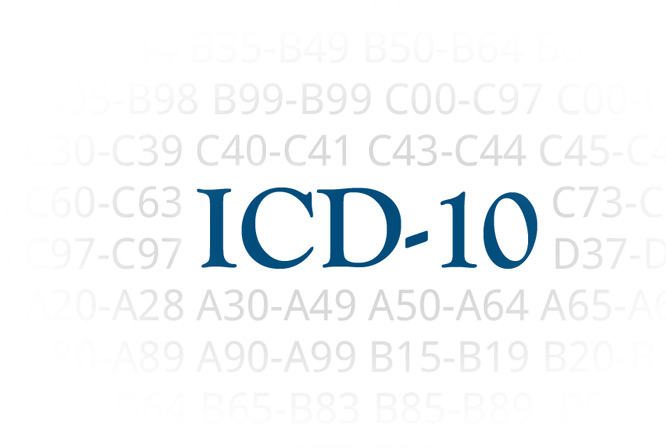OCD ICD 10 is something that a lot of people are talking about right now. But what does it mean? And more importantly, what do you need to know about it? In this blog post, we will discuss everything you need to know about OCD ICD 10. We will cover the basics, such as the definition and symptoms, as well as some of the treatment options available. So if you are wondering what OCD ICD-10 is all about, read on!
Contents
What Is OCD?
 OCD is a mental health disorder that affects people of all ages. It is characterized by obsessions, or unwanted and intrusive thoughts, that lead to compulsions, or repetitive behaviors that the person feels they must do to ease their anxiety. OCD can be a debilitating condition that interferes with daily life.
OCD is a mental health disorder that affects people of all ages. It is characterized by obsessions, or unwanted and intrusive thoughts, that lead to compulsions, or repetitive behaviors that the person feels they must do to ease their anxiety. OCD can be a debilitating condition that interferes with daily life.
This condition is often misunderstood. People with OCD are not simply people who like to keep things clean or organized. OCD can be a very serious condition that can take over a person’s life. Moreover, studies have suggested that OCD may be genetic, meaning it can run in families.
There are a variety of symptoms that may be associated with OCD. For example, some of the symptoms are listed below:
- Excessive hand-washing
- Checking things repeatedly
- Avoiding certain numbers or colors
- Arranging objects in a specific way
- Hoarding objects
- Obsessing over symmetry or order
- Sexual obsessions
- Health anxiety
- Intrusive thoughts about harm coming to oneself or others
If you or someone you know is exhibiting any of the above symptoms, it is essential to seek professional help. OCD can be a very difficult condition to live with, but there are treatment options available that can help.
What Is The ICD-10?
The ICD-10 is the tenth revision of the International Statistical Classification of Diseases and Related Health Problems (ICD), a medical classification list by the World Health Organization (WHO). It is used to code and classify mortality data from death certificates, as well as morbidity data from both inpatient and outpatient hospital records.
The ICD-10 is believed to be more reliable than its predecessor, the ICD-09, as it is based on updated medical knowledge and practices. It contains over 55,000 codes for different diagnoses, making it much more specific than the ICD-09. Some researchers are concerned, however, that the ICD-09 was more user-friendly due to its smaller size.
Overall, OCD ICD-10 is a more specific and reliable way to diagnose OCD than the ICD-09. If you or someone you know is suffering from OCD, be sure to ask your doctor about the ICD-10, as it may be a more appropriate diagnosis.
What Are The ICD-10 Codes For OCD?
 The codes in ICD-10 are basically the alphabetical listing of all the diseases and their symptoms. In this case, the ICD-10 Code for OCD would be F42. It is important to note that these codes are not always exact, and sometimes multiple codes will be used to describe a single condition. However, they are generally accepted as the most accurate way to diagnose and track diseases.
The codes in ICD-10 are basically the alphabetical listing of all the diseases and their symptoms. In this case, the ICD-10 Code for OCD would be F42. It is important to note that these codes are not always exact, and sometimes multiple codes will be used to describe a single condition. However, they are generally accepted as the most accurate way to diagnose and track diseases.
For instance, there are several types of OCD so there are different ICD-10 Codes for each one of them. The most common type of OCD is F42.0, which is defined as “obsessive thoughts without compulsive acts”. This means that the person has obsessive thoughts, but does not act on them.
Another common type of OCD is F42.01, which is defined as “obsessive-compulsive disorder with contamination and washing”. This means that the person has a fear of contamination and will often wash their belongings excessively.
There are many other types of OCD, each with its own ICD-10 Code. However, these are the two most common. The diagnosis of OCD can be tricky, as many of the symptoms can be present in other disorders as well. However, if you or someone you know is displaying these symptoms, it is important to seek professional help. A trained mental health professional will be able to properly diagnose and treat OCD.
If you think you may have OCD, don’t wait to get help. The sooner you seek treatment, the better your chances are of living a happy and healthy life.
How Do ICD-10 Codes Help In OCD?
 There are a lot of different types of OCD, and each type has its own set of behaviors and compulsions. The codes of ICD-10 are really helpful in several ways. They help mental health professionals communicate with each other about their patients, they help insurance companies understand what treatments are necessary, and they can be used in research to track the prevalence of OCD.
There are a lot of different types of OCD, and each type has its own set of behaviors and compulsions. The codes of ICD-10 are really helpful in several ways. They help mental health professionals communicate with each other about their patients, they help insurance companies understand what treatments are necessary, and they can be used in research to track the prevalence of OCD.
One of the great things about ICD-codes is that they are very specific. This means that when a mental health professional is looking at a patient’s file, they can get a very clear picture of what the patient is dealing with. This is helpful in a number of ways. Some of the benefits are listed below:
- They can help mental health professionals communicate with each other about their patients
- ICD-10 codes can help insurance companies understand what treatments are necessary
- They can be used in research to track the prevalence of OCD
- Gives guidance to professionals for an accurate diagnosis
- Helps patients to recover their quality of life
- Also, it is cost-effective as it shortens the length of hospital stay
If you or someone you know is struggling with OCD, don’t hesitate to reach out to a mental health professional. With the right diagnosis and treatment, people with OCD can live happy and fulfilling lives. It would be best if you understood OCD ICD-10 codes are really helpful in order to get the most effective treatment possible. In conclusion, ICD-10 codes are very helpful in diagnosing OCD.
Who Can Diagnose OCD From ICD-10?
The diagnosis of OCD can be made by any mental health professional, some of these include:
Psychiatrist
A psychiatrist is a medical doctor who has specialized in mental health. They have the ability to prescribe medication and offer talk therapy. Also, a psychiatrist is someone who has completed medical school and a residency in psychiatry. It is believed that they are the most qualified mental health professional to make a diagnosis of OCD.
Clinical psychologist
A psychologist is a professional who has completed extensive training in the field of human behavior and mental processes. A psychologist can help you understand your thoughts, feelings, and behaviors. They can also provide support and guidance if you’re struggling with mental health issues.
 This is a mental disorder that is characterized by obsessions and compulsions. People with OCD often have intrusive thoughts that can be disturbing and cause a great deal of anxiety. A licensed social worker can help you understand and manage your OCD. They have an access to ICD-10 which can help you get the proper diagnosis and treatment.
This is a mental disorder that is characterized by obsessions and compulsions. People with OCD often have intrusive thoughts that can be disturbing and cause a great deal of anxiety. A licensed social worker can help you understand and manage your OCD. They have an access to ICD-10 which can help you get the proper diagnosis and treatment.
There is no one test that can diagnose OCD. A mental health professional will typically ask about your symptoms and how they impact your life. They may also ask you to complete a questionnaire or take a self-assessment. If you have OCD, you may be treated with medication, therapy, or a combination of the two.
It is important to get treatment for OCD because it can significantly impact your life. If you are struggling with OCD, reach out to a mental health professional today. With treatment, you can learn to manage your symptoms and live a fulfilling life.
How To Cope With OCD?
There are many ways to cope with OCD. Some people may find that therapy is helpful, while others may find that medication is necessary. There are also many ways to cope with OCD on your own. Here are some tips:
Identify your triggers
What situations or activities make your OCD symptoms worse? Avoiding these triggers can help reduce your symptoms. The triggers of OCD can be different for everyone. It is believed that certain types of triggers may set off OCD, such as:
- Stressful life events
- Certain personality traits
- A family history of OCD
- Certain medical conditions
When you identify your triggers, you can try to avoid them. If you cannot avoid them, you can try to prepare for them in advance.
Learn about your condition
The more you know about OCD, the more empowered you will feel. When you understand what OCD is and how it works, you can better stand up to its challenges. Because if you are not educated about your disorder, OCD will take advantage of your lack of knowledge and use it against you. So learn all you can about OCD and arm yourself with the power of information.
There are several online resources and offline books to help you understand the condition. You just need to be willing to put in the work to learn about it. And once you do, you will be better equipped to manage your OCD and live a happier, healthier life.
Create a daily routine
A daily routine can help you feel more in control of your life and your OCD. When you have a set schedule, it can be easier to stick to your treatment plan and resist compulsions. Plus, having a routine can help reduce anxiety and provide a sense of predictability in an otherwise chaotic world.
So take some time to sit down and map out your ideal day. Include time for breakfast, lunch, and dinner, as well as time for work, school, and hobbies. And be sure to schedule time for self-care, such as exercise, relaxation, and meditation.
Stick to your treatment plan
If you want to get better, you have to be willing to put in the work. That means seeing your therapist regularly and taking your medication as prescribed. It might not be easy, but it’s important to stick to your treatment plan. Moreover, there are other things you can do to help manage your OCD.
Because therapies are considered the “first line of defense” against OCD, most insurance companies will cover the cost of treatment. If you don’t have insurance, there are still options available to you. Many therapists offer sliding scale fees, which means they charge based on your ability to pay. There are also a number of free or low-cost mental health clinics across the country. So stick to your treatment plans to let them work for you.
Get support from family and friends
 It can be helpful to talk to friends or family about your OCD. They can offer support and understanding. You may also want to join a support group for people with OCD. As they can be a great source of information and support, your local mental health center may also be able to help you find a group.
It can be helpful to talk to friends or family about your OCD. They can offer support and understanding. You may also want to join a support group for people with OCD. As they can be a great source of information and support, your local mental health center may also be able to help you find a group.
You should never underestimate the support from family and friends. They can provide a great deal of understanding of your situation. Additionally, joining an OCD support group can be very beneficial. You can find these groups through your local mental health center.
If you are struggling with OCD, there are many resources available to help you. The above tips can get you started on your road to recovery. Remember that you are not alone in this and there is hope for a better future. OCD can be a lifelong battle, but there are many ways to manage the symptoms and live a fulfilling life. With the right resources, you can take control of your OCD and start living the life you want to live.
Conclusion
Conclusively, OCD ICD-10 is a mental disorder that is often characterized by obsessions and compulsions. The main difference between OCD and other disorders is that individuals with OCD are aware of their thoughts and behaviors as being excessive, but are still unable to control them. If you think you may be suffering from OCD, it is important to seek professional help in order to receive an accurate diagnosis and proper treatment.
OCD can be a debilitating disorder, but with proper treatment, many people are able to lead happy and productive lives. Also, you must understand that you are not alone in this battle. There is a whole community of people who understand what you are going through and want to help you in any way they can.
For more information and resources on OCD, please visit the website of Therapy Mantra. The team of experts can help you understand your disorder and provide you with the tools you need to manage it effectively. Do not hesitate to reach out for help, you can also book an online counseling and therapy session or download our free OCD treatment app on Android or iOS.


